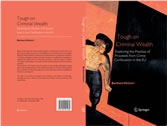Suchen und Finden

Tough on Criminal Wealth - Exploring the Practice of Proceeds from Crime Confiscation in the EU
Mehr zum Inhalt

Tough on Criminal Wealth - Exploring the Practice of Proceeds from Crime Confiscation in the EU
Based on the expertise of thirty leading experts on confiscation in the EU, this is the first book to analyse the practice of proceeds from crime confiscation in the original fifteen EU Member States. It examines the implementation of confiscation provisions in all three (investigative, judicial and disposal) phases of confiscation proceedings. It quantifies the enforcement of confiscation provisions in the EU, using an innovative and unique methodology and thereby furnishes understanding of obstacles and best practices.
The conclusion of the book is that the 'tough on criminal wealth' philosophy is largely alien to the everyday practice of law enforcement agencies. Putting criminals behind bars is still the main aim of the system, and most of the scarce resources available are devoted to achieving this.
This title is of interest to academics and students in the fields of criminology, sociology, and law, as well as to law enforcement officers, public prosecutors, and policymakers.
Alle Preise verstehen sich inklusive der gesetzlichen MwSt.


















